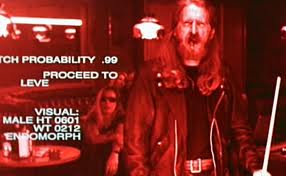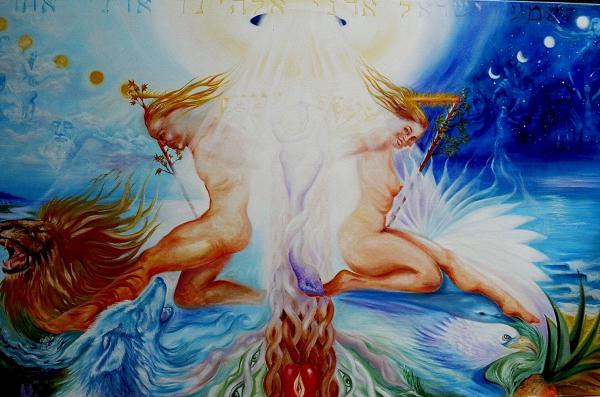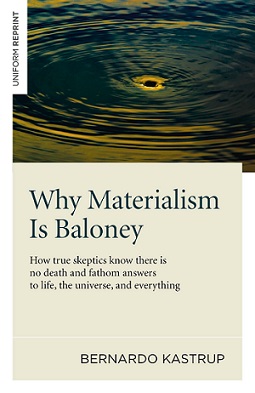|
home | what's new | other sites | contact | about |
||||||
|
Word Gems exploring self-realization, sacred personhood, and full humanity The original Hebrew reveals a deeper meaning for "It is not good the 'the adam' to be alone."
Whose helper? After the naming of the animals, after reviewing all of their kinds and species, "The Adam," despondent and alone, notes to himself that "there was no help suitable for him."
One might be alone without experiencing loneliness. And there is deeper meaning within Gen. 2:18 than that of mere desire for companionship.
The second clay tablet of Genesis presents to us "The Adam" in an undivided state. Eve has not yet been created. The Adam is neither he, she, nor it, but an undifferentiated male-female entity as representative of the human kind.
Can we attain attain our spiritual goal alone? The answer seems to be hinted at in Gen. 2:18. It is God not The Adam who asserts that it is not good for the human to remain in an undifferentiated state. How do we know that "alone" refers to this undifferentiated state and not to mere loneliness? In addition to the Hebrew, the story itself - what happens next - tells us what "alone" means. God's answer to the man's "aloneness" is (1) to set The Adam about the task of naming the animals; then, (2) to create Eve, the differentiated female; (3) but, when this happens, a differentiated male is also created.
What was the naming all about? It was to heighten The Adam's awareness of his need for differentiation.
Doesn't the creation of Eve indicate simply that The Adam was lonely and needed a companion? Not really. Not at all. As we've discussed, The Adam, a fictional construct, was neither male nor female; that is, he wasn't a male who needed female companionship. The unique circumstances surrounding the creation of Eve signal to us that much more is involved. God could have created Eve from the "dust of the ground," as a separate creative act, just as The Adam was formed. Instead, Eve is made from The Adam's body. No other female animal was created in this way. And, by this process, The Adam is differentiated as both male and female.
The male was made from The Adam's body, too. Only upon her "surgical removal" did The Adam become an individualized male. All this is fiction, but it's meant to illustrate an eternal principle.
Why this focus upon The Adam's differentiation? The psychic-shaman author of Genesis does not waste space in this brief account. It's not easy to write on clay tablets, every word counts. He means to say something important about the nature and purpose of romantic love. What is it? I think that the unfolding story will tell us. Upon Eve's arrival, the newly created male receives her with gushing excitement. He is overjoyed with this "help meet," this companion mirror-opposite to himself (Gen. 2:23). But, in this effusiveness, he revels in his perception of their sameness, not in their differences. He joyously exclaims, "You are just like me! You are me, in another form!" Is this not strange? The Adam had never before known differentiated maleness and femaleness. This is new. But now the male revels only in their sameness. This fact seems to be highlighted by the author:
We could paraphrase this famous verse as, "While anatomical differences would be plain to each of them, they reveled only in perceptions of sameness. The intoxicating thrill, the extreme delight, of having found each other, of being together, created an unawareness of biological / psychological / spiritual disparities. Nakedness, openness, defenselessness, seemed to them as their natural state; as, indeed, such was the requisite mental disposition for them to grow together as One." In other articles, I have commented that the essence of romantic attraction is a sense of what I call "the utter familiarity"; the feeling, now in her presence, of having "come home." All this is true, and we shall not diminish its value here. But, I think, though this perception is correct, and one exceedingly difficult to find in life, the overriding sense of sameness is the easy part to apprehend.
Match Probability 0.99 To know "the utter familiarity" - not mere animal passion - is to receive a flashing red signal from one's own soul, an authentication of the identity of a Cosmic Twin. Think of The Terminator in the bar scene looking for a set of clothes. His internal scanning intelligence flashes the word match.
The whole process of sacred romance begins with The Utter Familiarity; of 'you are just like me, you are my equal' The sense of "the utter familiarity," of "coming home," of "you are just like me," is the scanning success - the end of a lifetime's search by your soul - and the "match" flashing wildly on the internal screen of your deepest self ... a match probability of 0.99. When you are blessed to know this sensation of extreme familiarity - I mean, the authentic version of this - then you can be assured that you have found your eternal Twin Soul. If you are thinking, "that's never happened to me," just know, as Silver Birch instructs, it will happen only once, whether in this life or [most likely in] the next. But, as I said, though you may spend a lifetime looking for it, a sense of "the utter familiarity" is the easy part. The Universe has much more in mind for starry-eyed Twin lovers than feelings of sameness. What is it? The psychic-shaman author tells us:
The Utter Familiarity, this delicious view of her as "just like me," as "you are my equal," is the easy part because the Ego is not so much threatened by similarity. But living with her, in a world of differences, of polar opposites, of giving and receiving, though she may represent a perfect "opposite-sameness," will be more difficult; the actual process of becoming One Person is difficult because it will require a diminishment of the Small Ego, and it won't go away quietly. However, negotiating differences will never be easier than with a cosmic romantic Twin. But Adam, in those initial moments of finding out about his Beloved, could only feel overwhelmed by the sameness, The Utter Familiarity. And that's enough to start.
Wait a minute. Do you see the irony here? The Adam, while naming the animals, became aware that he was a single undifferentiated entity, unlike the male-female individualized animals about him. God's solution, not Adam's, was to split 'The Adam' into two - a male human and a female human.
Splitting 'The Adam' - One became Two in order to become One
This might be the greatest ironical turn-of-phrase in history. I think the author is playing with us in order to make a very important point. The psychic-shaman author, like a member of a Greek chorus, now turns to the audience and offers an editorial comment. We are instructed as to the purpose of Ish's gushing, his initial sense of The Utter Familiarity. The purpose of romantic attraction, the author explicitly tells us, is to be "glued" to one's mate, and to such extent as to become One Person.
This means that Jesus uses the term "one" not in reference to sexual union but in the sense that two people, male and female, are no longer two individuals but, in an idealized sense, one undifferentiated person.
Splitting and then Gluing The Adam: One to Two to One
How strange. "The Adam" began as One Person, but was then divided by God as male and female. And now, thus separated, their purpose is to become One Person again. These parallel thoughts are most striking and command our attention.
The Hebrew word 'alone' offers the sense, 'undifferentiated'
God is saying, "It is not good for The Adam to exist in a condition of separation from his natural state, male and female; not good for him to be undifferentiated." We can see this sense in the Hebrew by what happens next - a female is taken from The Adam's body; and then, a differentiated male comes into existence, as well. A better, clearer, expanded translation of Gen. 2:18 would be this:
Having been rescued from Oneness, and having received a state of individualized Duality, the male and female are then instructed to become One Person again. This grand paradox represents a high order of the mashal as teaching device.
Can one attain one's destiny alone? This is the great underlying and implied question here. God is saying, "It is not good for The Adam to live as an undifferentiated creature because, in that condition of singularity, the destiny of humanity cannot be attained." In the Genesis story, when each element of the universe was created, we find God saying that it is "good." The creation of the universe is "good" because it will help humanity achieve its destiny. But The Adam, in an undifferentiated state, is "not good" because this condition will hinder humanity's development. This is a very important concept. It speaks almost directly to the purpose of romantic love. According to this psychic-shaman report, handed down to us in the ancient Genesis account, we are informed by the Spirit World that humanity will reach its destiny - that of becoming more and more like Mother-Father God - by individualized male and female dialectic interaction.
There's another part to Gen. 2:18. And it's suddenly very clear what it means. Here's the 2nd half of Gen. 2:18: "... I will make him an help meet for him." Other sections of this article explain the Hebrew meanings for "help" and "meet." And let's also keep in mind what we've learned about "The Adam." This verse has so often been used by dark-spirited religionists to demean and subjugate women with, "Woman was made to be Man's little helper - so go and clean the house and make my supper." Like virtually everything from Orthodoxy, this interpretation is just so much propaganda. For centuries, it's been used to keep women from wandering off the plantation. Look at what's really happening here in the Genesis story.
helpers - to each other We have The Adam, neither male nor female, being told by God that he cannot achieve his destiny in a state of undivided singularity. Keep clearly in mind that "The Adam" refers to both male and female! In Gen. 1: 26, 27 and in Gen. 5: 1, 2 we are specifically told that The Adam means both male and female. The statement, "I will make him an help meet for him," was made to The Adam before the separation into male and female. At this early stage, The Adam is just as much female as male. Therefore, the intention to create a "help meet" is not offered with some assumed notion of a superior male. The individualized male does not yet exist at this point. The Adam is The Representative Human, neither male nor female, but some sort of composite male-female entity. Therefore, "help meet" is promised just as much to female as it is to male. Here is an expanded translation of the 2nd half of Gen. 2:18:
The Adam, the archetypal male and female of the Genesis story, represents Twin Souls created together, split apart, and then sent on a mission to recapture their Oneness.
The word suitable ("meet") speaks to the perfect opposite-sameness that is experienced only by Twins ... only they can teach each other, because only they can reach each other. As these Cosmic Two "travel on" the path of Life, they will help each other to achieve the destiny for which they were created.
it is not good for The Adam to be all-one
Professor John McWhorter I had finished this article, was watching a lecture by linguist, Dr. John McWhorter, on the history and development of language. Words have fluid identities, are slippery things, and change over time along with culture and ideas; a "semantic drift," McWhorter calls it. But I was suddenly jolted by a factoid he casually threw out. Some hundreds of years ago, our modern word "alone" lived another Old English past-life, as it carried with it the spelling, and something of the sense, of "all one". I've already presented to you evidence that the underlying Hebrew word for "alone" in Gen. 2:18 does not refer to any notion of The Adam's social privation. This was no suggestion by God that he really needed to get out more, mix it up, and live a little. But now there is also instruction that not just the Hebrew but the English word "alone" carried with it a special connotation of "undifferentiation," of "all one"; external corroboration for which is found in the very context of the narrative which demands this undiluted meaning. The Adam, as we have seen, was "all one," a composite-being of undifferentiated male-female essence. Again, why, apart from word origins, do we have credible certainty that "alone" means "all one," something deemed by Divinity to be "not good"? Even more than etymological clues, the contextual evidence is overwhelming; the story itself tells us the meaning. After God's evaluation, The Adam, in his "all-oneness," is then taken and divided into "the two" - male and female - a most poetic allusion to the co-birth of Twin-Soul lovers.
|
||||||
|
|







